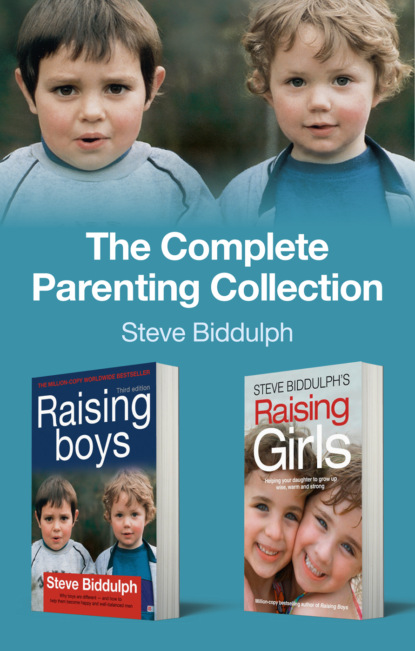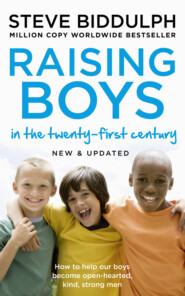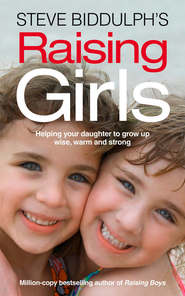По всем вопросам обращайтесь на: info@litportal.ru
(©) 2003-2024.
✖
The Complete Parenting Collection
Автор
Год написания книги
2018
Настройки чтения
Размер шрифта
Высота строк
Поля
One day, in his early to mid-teens, each boy makes a very important discovery. A light globe goes on above his head. It suddenly occurs to him that he is bigger than his mother! Even the sweetest, gentlest boy just can’t help realising, sooner or later: ‘She can’t make me do it!’
The thought leads to action and, sooner or later, a boy will try to get the best of Mum by bluffing or intimidating her, even in subtle ways. This is an important teaching moment. Don’t panic, it isn’t necessary to worry or get scared.
Picture this if you will. Fourteen-year-old Sam is in the kitchen. Sam’s job is to do the dishes – clear them up, scrape them off, put them in the dishwasher and switch it on. No big deal – he’s done it since he was nine. But last night, he didn’t finish the job. So, tonight, when his mother goes to get the dishes from the dishwasher (to serve up the meal his father has cooked!) they are in there, unwashed, with green fur growing on them.
Sam’s mum naturally pulls him up. ‘What’s happened?’ But tonight Sam is fourteen! He heaves his shoulders back, he stalks about. Perhaps he speaks a little disrespectfully to his mother, under his breath.
Now let’s imagine this family is really lucky. One, it includes a father. Two, he’s home. And, three – he knows his job!
Sam’s father is in the lounge room reading the paper (kind of keeping an overview of things). He picks up on what is going on in the kitchen. This is his cue! Something deep inside him has been waiting for this moment. He folds his paper, strides to the kitchen, and leans on the fridge. Sam can feel him come in – it’s a kind of primeval moment, hormonal. He can feel the shift of power. The father looks long and hard at Sam and says some time-honoured words – words that you probably heard when you were fourteen.
‘Don’t speak to your mother in that tone of voice … ’
Now, Sam’s mother is a twenty-first-century woman, and is quite capable of dealing with Sam. The difference is she is not in it alone. Sam realises that there are two adults here who respect and support each other and who are going to bring him up well. The key feeling is ‘gentle but firm’. It’s as if they are saying to Sam, ‘You are a good kid, but you are not raised yet. We will work on that together to help you become a fine young man.’
Most importantly, Sam’s mother knows that she does not need to ever feel intimidated in her own home. It’s not a physical thing between the father and son, but a kind of moral force. If the father is for real, if he respects his partner and has credibility, then it will work every time, even if some more discussion is needed. The discussion should not be about the dishes, but about how to converse respectfully and safely. (If a mother is raising a boy on her own, things have to take a slightly different tack – this is discussed in the chapter on mothering, ‘Mothers and sons’.)
STORIES FROM THE HEART
IS IT ADD OR DDD (DAD DEFICIENCY DISORDER)?
Several years ago, a man called Don came up to me after a lecture, and told me this story. Don was a truck driver and, a year earlier, his son, aged eight, had been diagnosed with Attention Deficit Disorder. Don read the diagnosis and, for want of better information, decided it meant his son Troy wasn’t getting enough attention. That, surely, was what ‘attention deficit’ meant!
Don set himself the goal of getting more involved with Troy. He had always taken the view that raising children was best left to ‘the missus’ while he worked to pay the bills. Now all of that changed. In the holidays, and after school when possible, Troy rode in the truck with his dad. On weekends, whereas Don had often spent the time away with mates who collected and rode classic motorcycles, Troy now came along too.
‘We had to tone down the language and clean up our act a bit, but the blokes all understood, and some started bringing their kids, too,’ Don told me with a smile.
The good news: Troy calmed down so much in a couple of months that he came off his Ritalin medication – he wasn’t ‘ADD’ any longer. But father and son continue to hang out together – because they enjoy it.
Note: We are not saying here that all instances of Attention Deficit Disorder are really Dad-deficit disorders – but quite a lot are. (For more about ADD, ADHD and boys, see Chapter 10 (#litres_trial_promo).)
Sadly, many dads don’t get this aspect of their role. I’ve seen dads come in to this conversation and say, ‘Why are you picking on the kid?’ or ‘Why are you making such an issue of it darling?’ or ‘Hey you guys, I can’t hear the TV!’ These dads are undermining their wives. This is a disaster, when a mother is doing the hard stuff, and the father cuts her legs out from under her. These men are in for a terrible time. The gods, and the women, smile on those men who stand alongside them without getting too heavy, and just add their support to the situation.
STORIES FROM THE HEART
LETTER FROM A FATHER
Dear Steve,
We have had many challenges with our son, and he with us! I’m pleased to say that things are going well for him. Other parents of boys might like to share some things we have learnt.
The biggest difference between Matt and his sister Sophie was that Matt was very impulsive and had explosive energy. When he was eight, he ran straight out in front of a car without even pausing to look. Luckily the driver had seen Matt’s ball roll onto the road and was already braking hard! The car just missed him. Boys don’t seem to always think before they act.
We really got it wrong with Matt in his early teens. Because his sister had been so easy to negotiate with, we assumed he would be the same. But he just didn’t do his housework, his homework, or keep to agreements about when he would be in. Reasoning wasn’t enough with him – until we realised he was crying out for firm boundaries and enforced consequences. We had been threatening him, sure, but just not carrying out consequences. When we finally did this consistently (feeling pretty mean sometimes), then he improved out of sight. The thing was, he was happier, too. I think some boys just need this.
Something that really helped Matt was the peer support scheme. In Year 6 at primary school he had a nursery child to take care of and protect. This gave him a sense of being important and he came home full of stories about his younger charge – how the little boy learnt, what he got up to. We saw a whole different side to him. Then in Year 7 at high school, he had a Year 11 peer support boy who watched out for him in a bullying situation, so he benefited both ways.
Around this time we learnt that although he was ratty at home, the teachers thought he was great at school! So it was just that he was letting off steam with us. Lots of parents I’ve talked to recognise this ‘school angel-home devil’ situation!
At around fourteen and fifteen we felt Matt was drifting into his own world – rarely talking to us, just eating and disappearing, and giving us no insight into his world of school, his friends and so on. Our only communication seemed to be in telling him off. Luckily we always eat dinner together at the table, and this was the one time we got to talk. We resolved to have more time together – father and son weekends away. My wife decided to get out of the negative cycle and to give compliments to Matt, not just criticisms. He responded quite warmly. I think we had just got caught in a negative pattern. Boys do want to be friends; they don’t want to live in their own world, which is often quite lonely.
We both benefited from a parenting course. The best things we learnt were: use ‘I messages’ (like ‘I was scared when you didn’t come home at the agreed time. I need you to make agreements you can keep.’) instead of ‘You are unreliable and useless! You had better come home or else!’; also, how to listen to kids’ problems, so they can talk them over, instead of jumping in with advice.
We are a lot happier now, and Matt is a sociable and pleasant young man, instead of a surly boy. It’s important never to give up with your kids. Keep learning and getting help if you are stuck. You can always improve things if you try. Kids really need you to keep communicating with them.
You don’t have to have all the answers
When I was a young man, I studied martial arts in my spare time. I was pretty bad at it, but I liked the idea of being able to defend myself and others. Perhaps I would get a chance to rescue a beautiful maiden. The one time I got mugged though, the mugger didn’t use any of the attacks I had learnt to defend. I remember thinking, ‘Damn, I wish he would attack me the way I was taught! (Luckily the mugger had terrible timing, and some police actually came round the corner and arrested him in the act.)
Being a father is rather like this. We men think we have to be completely prepared; or worse, we think that if we don’t know what to do, there’s something wrong with us. But parenthood is all about stuffing up. That’s how you learn. Kids keep changing, each kid is different, and it’s only by stuffing up that you get it right. The trick is to keep wide awake and see what works, and change if it doesn’t.
As our kids reach new ages and create new challenges, we inevitably lose the plot at times. Can they stay at their new friend’s place overnight?, Is that film suitable for them to watch?, What is a fair consequence for this misbehaviour? … Sometimes it’s a difficult call.
What to do? If you don’t have an answer on the spot, then it’s okay to stall. The best thing to do is simply talk it over with your partner or a friend. If you are both stuck, talk it over with other parents. My kids know that if they hassle me, I am more likely to give an unfavourable decision, so they have become more careful! But if I genuinely don’t know what to do or say, I reply, ‘Well, I’m not happy about it, but I’ll sleep on it and we’ll talk some more tomorrow.’ As long as you always follow up, this response works well. Family life is a work in progress. You only get in trouble if you ‘have to be right’ and you ‘have to show them who’s boss’. If you are human, it goes much better.
Finding the balance is hard
It’s okay to be unpopular with your kids once or twice a day! If you have lots of good time together and a long history of care and involvement to draw on, then you have goodwill saved up, like money in the bank. Sometimes dads are around so little, they want it all to be smooth sailing when they are there. But kids need to know when they do something wrong. It can be hard to find that middle point between hard and soft. Maybe it’s about being clear, and not about using power or force at all.
I have a friend, Paul, who is very close to his kids – I admire and envy how natural a father he is. But he too gets it wrong sometimes. Paul told me once how he ‘lost it’ with his twelve-year-old son after a nightmare day at work. He exploded over some small thing and sent the boy off to his bedroom, yelling at him as he went. The son deserved hardly any of this, the yelling was louder than was necessary, the boy was wincing in fear – it was a disaster.
Paul stood for minutes, ashamed and red-faced at what he had done. He realised it had to be fixed. He went and sat on the boy’s bed. He apologised. The boy said nothing, just lay face down on the bed. But ten minutes later, the father was in the bathroom. The boy walked past him on the way to brush his teeth and get ready for bed. As he passed, he uttered some words that touched his father’s heart in a most unforgettable way: ‘Why is it so hard to hate you?’
Dads do matter
Even today, after a whole revolution in fathers’ roles, people still ask: do dads matter? Can’t mothers do it all?
The research supporting the importance of dads is overwhelmingly clear. Boys with absent fathers, or with problem fathers, are statistically more likely to be violent, get hurt, get into trouble, do poorly in school, and be members of teenage gangs in adolescence. They are less likely to progress to university or have a good career. They marry less successfully, and are less effective fathers themselves. A good mum can make up for not having a father around, but it’s really, really hard work.
Fatherless daughters are more likely to have low self-esteem, to have sex before they really want to, to get pregnant young, be assaulted or abused, and not continue their schooling. Families without men are usually poorer, and children of these families are likely to move downwards on the socio-economic ladder. Is that enough to convince you?
Fathering is the best thing you are ever likely to do – for your own satisfaction and joy, and for its effect on the future of other human beings. And it’s good fun.
PRACTICAL HELP
DADS AND DAUGHTERS
It’s not the topic of this book, but in case this is the only parenting book you ever read, here is something about girls. Mothers are the security blanket for daughters, their major support system, but dads are the self-esteem department. This is because for most girls, the opposite sex is important, and you are their practice person for the opposite sex.
For this reason, you sometimes have five times the power your spouse has to either bless or wound your daughter. Think of it like a sword: you can either cut, or place it gently on her shoulder and say, ‘Arise, Princess’!
So don’t ever, whatever you do, criticise her looks, her weight, or any aspect of her appearance. Not ever. You can debate what clothes she might wear if they are too revealing, but even here get her mother’s help.
What you can do is spend time with her at sports, activities, even just driving her places, and above all, talk and be interested. Go to a movie with her, stop for a coffee and a chat when you shop together. A dad who is close to his daughter is so good for her, because he becomes the yardstick by which she measures boys. It’s as if she knows she is interesting, intelligent and worthwhile. Boys have to measure up to this – which eliminates 80 percent of them right off! This has to be a good investment!
IN A NUTSHELL
Make the time to be a dad. In society today, men are often little more than walking wallets. You have to fight to be a real father to your kids.











